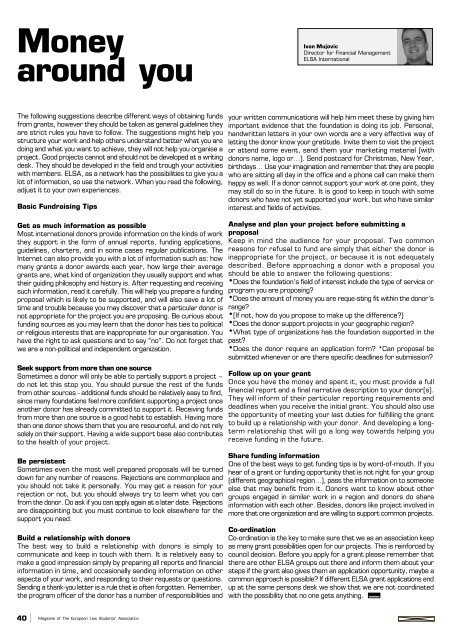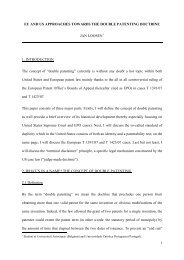Synergy #33 Spring edition 2003 - European Law Students ...
Synergy #33 Spring edition 2003 - European Law Students ...
Synergy #33 Spring edition 2003 - European Law Students ...
You also want an ePaper? Increase the reach of your titles
YUMPU automatically turns print PDFs into web optimized ePapers that Google loves.
Money<br />
around you<br />
The following suggestions describe different ways of obtaining funds<br />
from grants, however they should be taken as general guidelines they<br />
are strict rules you have to follow. The suggestions might help you<br />
structure your work and help others understand better what you are<br />
doing and what you want to achieve, they will not help you organise a<br />
project. Good projects cannot and should not be developed at a writing<br />
desk. They should be developed in the field and trough your activities<br />
with members. ELSA, as a network has the possibilities to give you a<br />
lot of information, so use the network. When you read the following,<br />
adjust it to your own experiences.<br />
Basic Fundraising Tips<br />
Get as much information as possible<br />
Most international donors provide information on the kinds of work<br />
they support in the form of annual reports, funding applications,<br />
guidelines, charters, and in some cases regular publications. The<br />
Internet can also provide you with a lot of information such as: how<br />
many grants a donor awards each year, how large their average<br />
grants are, what kind of organization they usually support and what<br />
their guiding philosophy and history is. After requesting and receiving<br />
such information, read it carefully. This will help you prepare a funding<br />
proposal which is likely to be supported, and will also save a lot of<br />
time and trouble because you may discover that a particular donor is<br />
not appropriate for the project you are proposing. Be curious about<br />
funding sources as you may learn that the donor has ties to political<br />
or religious interests that are inappropriate for our organisation. You<br />
have the right to ask questions and to say “no”. Do not forget that<br />
we are a non-political and independent organization.<br />
Seek support from more than one source<br />
Sometimes a donor will only be able to partially support a project –<br />
do not let this stop you. You should pursue the rest of the funds<br />
from other sources - additional funds should be relatively easy to find,<br />
since many foundations feel more confident supporting a project once<br />
another donor has already committed to support it. Receiving funds<br />
from more than one source is a good habit to establish. Having more<br />
than one donor shows them that you are resourceful, and do not rely<br />
solely on their support. Having a wide support base also contributes<br />
to the health of your project.<br />
Be persistent<br />
Sometimes even the most well prepared proposals will be turned<br />
down for any number of reasons. Rejections are commonplace and<br />
you should not take it personally. You may get a reason for your<br />
rejection or not, but you should always try to learn what you can<br />
from the donor. Do ask if you can apply again at a later date. Rejections<br />
are disappointing but you must continue to look elsewhere for the<br />
support you need.<br />
Build a relationship with donors<br />
The best way to build a relationship with donors is simply to<br />
communicate and keep in touch with them. It is relatively easy to<br />
make a good impression simply by preparing all reports and financial<br />
information in time, and occasionally sending information on other<br />
aspects of your work, and responding to their requests or questions.<br />
Sending a thank-you letter is a rule that is often forgotten. Remember,<br />
the program officer of the donor has a number of responsibilities and<br />
40<br />
Magazine of The <strong>European</strong> <strong>Law</strong> <strong>Students</strong>’ Association<br />
Ivan Mujovic<br />
Director for Financial Management<br />
ELSA International<br />
your written communications will help him meet these by giving him<br />
important evidence that the foundation is doing its job. Personal,<br />
handwritten letters in your own words are a very effective way of<br />
letting the donor know your gratitude. Invite them to visit the project<br />
or attend some event, send them your marketing material (with<br />
donors name, logo or…). Send postcard for Christmas, New Year,<br />
birthdays… Use your imagination and remember that they are people<br />
who are sitting all day in the office and a phone call can make them<br />
happy as well. If a donor cannot support your work at one point, they<br />
may still do so in the future. It is good to keep in touch with some<br />
donors who have not yet supported your work, but who have similar<br />
interest and fields of activities.<br />
Analyse and plan your project before submitting a<br />
proposal<br />
Keep in mind the audience for your proposal. Two common<br />
reasons for refusal to fund are simply that either the donor is<br />
inappropriate for the project, or because it is not adequately<br />
described. Before approaching a donor with a proposal you<br />
should be able to answer the following questions:<br />
*Does the foundation’s field of interest include the type of service or<br />
program you are proposing?<br />
*Does the amount of money you are reque-sting fit within the donor’s<br />
range?<br />
*(If not, how do you propose to make up the difference?)<br />
*Does the donor support projects in your geographic region?<br />
*What type of organizations has the foundation supported in the<br />
past?<br />
*Does the donor require an application form? *Can proposal be<br />
submitted whenever or are there specific deadlines for submission?<br />
Follow up on your grant<br />
Once you have the money and spent it, you must provide a full<br />
financial report and a final narrative description to your donor(s).<br />
They will inform of their particular reporting requirements and<br />
deadlines when you receive the initial grant. You should also use<br />
the opportunity of meeting your last duties for fulfilling the grant<br />
to build up a relationship with your donor. And developing a longterm<br />
relationship that will go a long way towards helping you<br />
receive funding in the future.<br />
Share funding information<br />
One of the best ways to get funding tips is by word-of-mouth. If you<br />
hear of a grant or funding opportunity that is not right for your group<br />
(different geographical region…), pass the information on to someone<br />
else that may benefit from it. Donors want to know about other<br />
groups engaged in similar work in a region and donors do share<br />
information with each other. Besides, donors like project involved in<br />
more that one organization and are willing to support common projects.<br />
Co-ordination<br />
Co-ordination is the key to make sure that we as an association keep<br />
as many grant possibilities open for our projects. This is reinforced by<br />
council decision. Before you apply for a grant please remember that<br />
there are other ELSA groups out there and inform them about your<br />
steps if the grant also gives them an application opportunity, maybe a<br />
common approach is possible? If different ELSA grant applications end<br />
up at the same persons desk we show that we are not coordinated<br />
with the possibility that no one gets anything.











